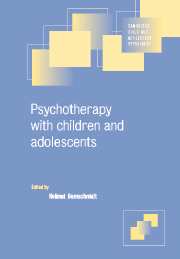Book contents
- Frontmatter
- Contents
- List of contributors
- Preface
- Part I Principles of psychotherapy with children, adolescents and families
- Part II Psychotherapeutic methods and settings
- Part III The practice of psychotherapy for specific disorders in childhood and adolescence
- 15 Anxiety disorders
- 16 Obsessive-compulsive disorder
- 17 Depressive syndromes and suicide
- 18 Dissociative [conversion] disorders
- 19 Disorders of sexual development and sexual behaviour
- 20 Substance abuse and addiction
- 21 Eating disorders
- 22 Psychotherapy in chronic physical disorders
- 23 Enuresis and faecal soiling
- 24 Dyslexia and dyscalculia
- 25 Stuttering
- 26 Hyperkinetic disorders
- 27 Autism
- 28 Schizophrenia
- 29 Conduct disorders, antisocial behaviour, delinquency
- 30 Physical abuse and neglect
- 31 Sexual abuse and sexual maltreatment
- Part IV The practice of psychotherapy in various settings
- Index
16 - Obsessive-compulsive disorder
- Frontmatter
- Contents
- List of contributors
- Preface
- Part I Principles of psychotherapy with children, adolescents and families
- Part II Psychotherapeutic methods and settings
- Part III The practice of psychotherapy for specific disorders in childhood and adolescence
- 15 Anxiety disorders
- 16 Obsessive-compulsive disorder
- 17 Depressive syndromes and suicide
- 18 Dissociative [conversion] disorders
- 19 Disorders of sexual development and sexual behaviour
- 20 Substance abuse and addiction
- 21 Eating disorders
- 22 Psychotherapy in chronic physical disorders
- 23 Enuresis and faecal soiling
- 24 Dyslexia and dyscalculia
- 25 Stuttering
- 26 Hyperkinetic disorders
- 27 Autism
- 28 Schizophrenia
- 29 Conduct disorders, antisocial behaviour, delinquency
- 30 Physical abuse and neglect
- 31 Sexual abuse and sexual maltreatment
- Part IV The practice of psychotherapy in various settings
- Index
Summary
Clinical picture
Obsessive-compulsive disorders are characterized by persistent obsessional thoughts or compulsive acts. Both phenomena occur repeatedly in a repetitive, stereotypic manner. The patient recognizes these thoughts and acts as senseless, but is unable to resist them. Obsessional thoughts are ideas, beliefs or impulses, which disturb the patient intensely, impairing his freedom to act. Compulsive acts or compulsive rituals are actions that are experienced as alien to the personality but which the patient feels compelled to undertake, so that he is unable to resist them permanently. Obsessive-compulsive symptoms are closely associated with anxiety. If patients refrain, or are prevented, from performing their compulsive ritual, they frequently experience severe anxiety or agitation.
In assessing the clinical picture it is important to bear in mind a number of points (Remschmidt, 1992): the varying severity of symptoms, the fact that symptoms to a great extent are situational, co-morbid symptomatology (most commonly anxiety, depression, sleep disorders, tics and occasionally aggressive impulses), premorbid personality traits, e.g. excessively adaptive behaviour, anxiousness, withdrawal, and the frequent occurence of specific conditional stimuli in up to one-third of all affected children and adolescents. In childhood and adolescence precipitating stimuli should be sought, e.g. sexual experiences, separation, illness of the child or a family member, death of a family member, etc. Obsessive-compulsive disorder may occur as a syndrome in its own right, but also as a constituent of other morbid states, e.g. organic psychiatric syndromes, anxiety disorders, schizophrenia and Gilles de la Tourette syndrome.
In ICD-10, obsessive-compulsive disorders are classified under the headings ‘predominantly obsessional thoughts or ruminations’ (F42.0), ‘predominantly compulsive acts [obsessional rituals]’ (F42.1) and ‘mixed obsessional thoughts and acts’ (F42.2).
- Type
- Chapter
- Information
- Psychotherapy with Children and Adolescents , pp. 276 - 290Publisher: Cambridge University PressPrint publication year: 2001



